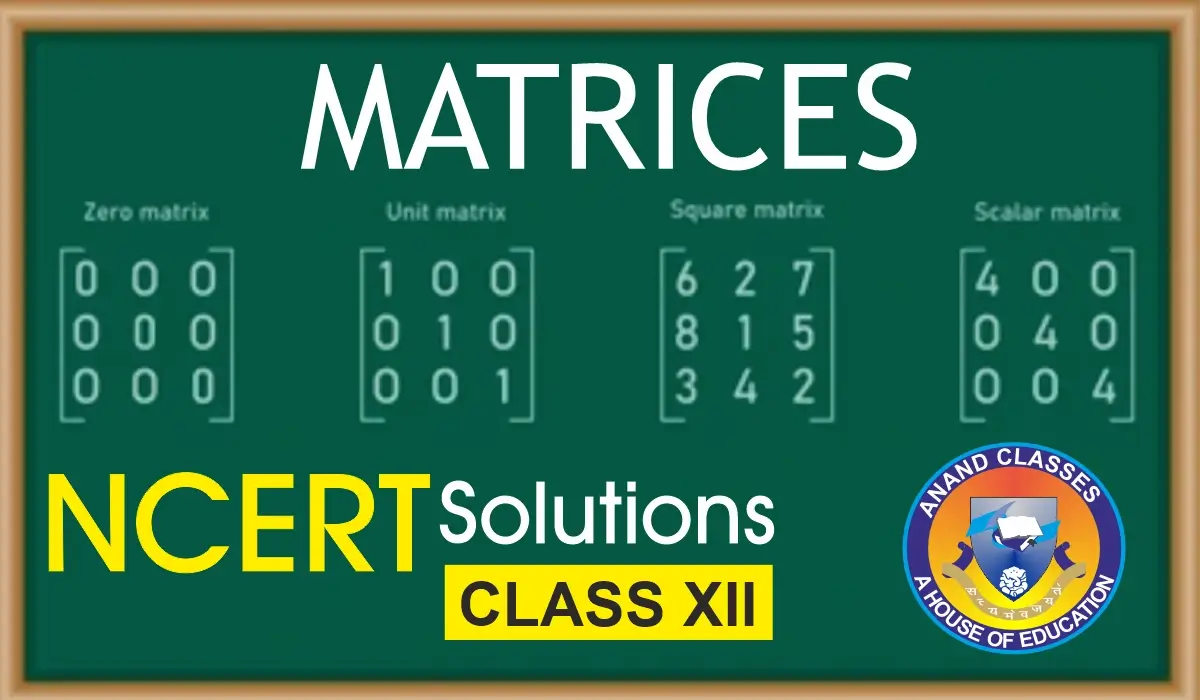Anand Classes offers updated NCERT Solutions for the Miscellaneous Exercise of Chapter 7 Integrals for Class 12 Mathematics, enabling students to practice advanced integration problems with accurate, step-by-step explanations. These Set-2 notes are prepared according to the latest NCERT and CBSE guidelines, ensuring strong conceptual clarity and effective exam preparation. Click the print button to download study material and notes.
NCERT Question.11 : Evaluate the integral
$$\int \frac{1}{\cos(x+a)\cos(x+b)}\;dx$$
Solution
$$\int \frac{1}{\cos(x+a)\cos(x+b)}\;dx$$
Use the identity
$$
\tan u-\tan v=\frac{\sin(u-v)}{\cos u\cos v}.
$$
With $u=x+a$ and $v=x+b$ we get
$$
\frac{1}{\cos(x+a)\cos(x+b)}
=\frac{\tan(x+a)-\tan(x+b)}{\sin(a-b)}.
$$
Hence
$$
\int \frac{1}{\cos(x+a)\cos(x+b)}\;dx
=\frac{1}{\sin(a-b)}\int\bigl(\tan(x+a)-\tan(x+b)\bigr)\;dx
$$
Integrate termwise using $\displaystyle\int \tan u\;du=-\ln\lvert\cos u\rvert$
$$
\int \frac{1}{\cos(x+a)\cos(x+b)}\;dx = \\[1em]
=\frac{1}{\sin(a-b)}\Bigl[-\ln\lvert\cos(x+a)\rvert+\ln\lvert\cos(x+b)\rvert\Bigr]+C $$
$$\int \frac{1}{\cos(x+a)\cos(x+b)}\;dx=\frac{1}{\sin(a-b)}\ln\left\lvert\frac{\cos(x+b)}{\cos(x+a)}\right\rvert +C
$$
Final Result
$$
\boxed{\;\displaystyle \frac{1}{\sin(a-b)}\ln\left\lvert\frac{\cos(x+b)}{\cos(x+a)}\right\rvert +C\;}
$$
Download concise, exam-ready notes by Anand Classes — perfect for JEE and CBSE students seeking top-quality worked solutions and clear step-by-step explanations.
NCERT Question.12 : Evaluate the integral
$$\int \frac{x^{3}}{\sqrt{1-x^{8}}}\;dx$$
Solution
$$\int \frac{x^{3}}{\sqrt{1-x^{8}}}\;dx$$
Let
$$t=x^{4}\quad\Rightarrow\quad dt=4x^{3}\;dx\quad\Rightarrow\quad x^{3}\;dx=\dfrac{1}{4}\;dt$$
Substitute:
$$
\int \frac{x^{3}}{\sqrt{1-x^{8}}}\;dx
=\frac{1}{4}\int \frac{1}{\sqrt{1-t^{2}}}\;dt
=\frac{1}{4}\sin^{-1}t + C
$$
Back-substitute $t=x^{4}$ :
$$
\int \frac{x^{3}}{\sqrt{1-x^{8}}}\;dx
=\frac{1}{4}\sin^{-1}\bigl(x^{4}\bigr)+C.
$$
Final Result
$$
\boxed{\;\displaystyle \dfrac{1}{4}\sin^{-1}\bigl(x^{4}\bigr)+C\;}
$$
Download clear, exam-ready integral solutions by Anand Classes — perfect for JEE and CBSE revision with concise, step-by-step explanations.
NCERT Question.13 : Evaluate the integral
$$\int \frac{e^{x}}{(1+e^{x})(2+e^{x})}\;dx$$
Solution
$$\int \frac{e^{x}}{(1+e^{x})(2+e^{x})}\;dx$$
Let $t=e^{x}$ so $dt=e^{x}\;dx$. The integral becomes
$$
\int \frac{dt}{(1+t)(2+t)}.
$$
Use partial fractions:
$$
\frac{1}{(1+t)(2+t)}=\frac{1}{t+1}-\frac{1}{t+2},
$$
since $\dfrac{1}{t+1}-\dfrac{1}{t+2}=\dfrac{(t+2)-(t+1)}{(t+1)(t+2)}=\dfrac{1}{(t+1)(t+2)}$.
Integrate termwise:
$$
\int\frac{dt}{(1+t)(2+t)}=\int\left(\frac{1}{t+1}-\frac{1}{t+2}\right)\;dt
=\ln|t+1|-\ln|t+2|+C.
$$
Substitute back $t=e^{x}$:
$$
\ln\bigl(1+e^{x}\bigr)-\ln\bigl(2+e^{x}\bigr)+C
=\ln\left|\frac{1+e^{x}}{2+e^{x}}\right|+C.
$$
Hence,
$$\int \frac{e^{x}}{(1+e^{x})(2+e^{x})}\;dx=\displaystyle \ln\left|\frac{1+e^{x}}{2+e^{x}}\right|+C$$
Final Result
$$
\boxed{\displaystyle \ln\left|\frac{1+e^{x}}{2+e^{x}}\right|+C}
$$
Download concise, exam-ready notes by Anand Classes — perfect for JEE and CBSE students seeking top-quality worked solutions and clear step-by-step explanations.
NCERT Question.14 : Evaluate the integral
$$\int \frac{1}{(x^{2}+1)(x^{2}+4)}\;dx$$
Solution
$$\int \frac{1}{(x^{2}+1)(x^{2}+4)}\;dx$$
Partial fraction decomposition. Assume
$$
\frac{1}{(x^{2}+1)(x^{2}+4)}=\frac{Ax+B}{x^{2}+1}+\frac{Cx+D}{x^{2}+4}.
$$
Multiplying through and comparing coefficients gives
$$
1=(Ax+B)(x^{2}+4)+(Cx+D)(x^{2}+1).
$$
Equating coefficients yields the system
$$
\begin{cases}
A+C=0,\\
B+D=0,\\
4A+C=0,\\
4B+D=1.\end{cases}
$$
Solving gives
$$
A=0,\quad C=0,\quad B=\frac{1}{3},\quad D=-\frac{1}{3}.
$$
Thus
$$
\frac{1}{(x^{2}+1)(x^{2}+4)}
=\frac{1}{3}\cdot\frac{1}{x^{2}+1}-\frac{1}{3}\cdot\frac{1}{x^{2}+4}.
$$
Integrate termwise.
$$
\int \frac{1}{(x^{2}+1)(x^{2}+4)}\;dx
=\frac{1}{3}\int\frac{1}{x^{2}+1}\;dx-\frac{1}{3}\int\frac{1}{x^{2}+4}\;dx $$
$$\int \frac{1}{(x^{2}+1)(x^{2}+4)}\;dx=\frac{1}{3}\tan^{-1}x-\frac{1}{3}\cdot\frac{1}{2}\tan^{-1}\bigl(\frac{x}{2}\bigr)+C$$
$$\int \frac{1}{(x^{2}+1)(x^{2}+4)}\;dx=\frac{1}{3}\tan^{-1}x-\frac{1}{6}\tan^{-1}\bigl(\frac{x}{2}\bigr)+C$$
Final Result
$$
\boxed{\displaystyle \frac{1}{3}\tan^{-1}x-\frac{1}{6}\tan^{-1}\bigl(\frac{x}{2}\bigr)+C}
$$
Download concise, exam-ready notes by Anand Classes — perfect for JEE and CBSE students seeking top-quality worked solutions and clear step-by-step explanations.
NCERT Question.15 : Evaluate the integral
$$\int \cos^{3}x\;e^{\log\sin x}\;dx$$
Solution
$$\int \cos^{3}x\;e^{\log\sin x}\;dx$$
Note that $e^{\log\sin x}=\sin x$ (where $\sin x>0$), so the integrand simplifies to $\cos^{3}x\sin x$. Thus
$$
\int \cos^{3}x\;e^{\log\sin x}\;dx=\int \cos^{3}x\sin x\;dx$$
Put $t=\cos x\Rightarrow dt=-\sin x\;dx$, hence $\sin x\;dx=-dt$. Therefore
$$
\int \cos^{3}x\sin x\;dx=-\int t^{3}\;dt=-\frac{t^{4}}{4}+C$$
Substituting back $t=\cos x$ gives
$$
\int \cos^{3}x\sin x\;dx=-\frac{\cos^{4}x}{4}+C
$$
Final Result
$$
\boxed{\;\displaystyle -\frac{\cos^{4}x}{4}+C\;}
$$
Download concise, exam-ready notes by Anand Classes — perfect for JEE and CBSE students seeking top-quality study material and clear worked solutions.
NCERT Question.16 : Evaluate the integral
$$\int e^{3\log x}\;(x^{4}+1)^{-1}\;dx$$
Solution
$$\int e^{3\log x}\;(x^{4}+1)^{-1}\;dx$$
Since
$$
e^{3\log x}=e^{\log x^{3}}=x^{3}
$$
the integral becomes
$$
\int \frac{x^{3}}{x^{4}+1}\;dx.
$$
Let
$$
t=x^{4}+1\Rightarrow dt=4x^{3}dx\Rightarrow x^{3}dx=\frac{dt}{4}.
$$
Thus,
$$
\int \frac{x^{3}}{x^{4}+1}\;dx=\frac14\int \frac{dt}{t}=\frac14\log|t|+C
$$
Substituting back $t=x^{4}+1$ gives
$$
\int \frac{x^{3}}{x^{4}+1}\;dx=\frac14\log(x^{4}+1)+C.
$$
Final Result
$$
\boxed{\;\displaystyle \frac14\log(x^{4}+1)+C\;}
$$
Access beautifully structured calculus notes and solved examples by Anand Classes — ideal for JEE and CBSE preparation with clear simplified formatted solutions.
NCERT Question.17 : Evaluate the integral
$$\int f'(ax+b)\;[f(ax+b)]^{n}\;dx$$
Solution
$$\int f'(ax+b)\;[f(ax+b)]^{n}\;dx$$
Let
$$
t=f(ax+b)\Rightarrow dt=a\;f'(ax+b)\;dx.
$$
Thus,
$$
f'(ax+b)\;dx=\frac{dt}{a}.
$$
Substitute into the integral:
$$
\int f'(ax+b)\;[f(ax+b)]^{n}\;dx
=\frac1a\int t^{n}\;dt.
$$
Integrating,
$$
\frac1a\int t^{n}\;dt=\frac1a\cdot \frac{t^{,n+1}}{n+1}+C.
$$
Substituting back $t=f(ax+b)$, we obtain
$$
\int f'(ax+b)\;[f(ax+b)]^{n}\;dx=\frac{(f(ax+b))^{,n+1}}{a(n+1)}+C
$$
Final Result
$$
\boxed{\displaystyle \frac{(f(ax+b))^{n+1}}{a(n+1)}+C}
$$
For more expertly formatted calculus notes and integral shortcuts, explore Anand Classes — perfect for CBSE and JEE aspirants seeking high-quality study material.
NCERT Question.18 : Evaluate the integral
$$\int \frac{1}{\sqrt{\sin^{3}x\;\sin(x+\alpha)}}\;dx$$
Solution
$$\int \frac{1}{\sqrt{\sin^{3}x\;\sin(x+\alpha)}}\;dx$$
Write the integrand as
$$
\frac{1}{\sqrt{\sin^{3}x\;\sin(x+\alpha)}}
=\frac{1}{\sin^{3/2}x\;\sqrt{\sin(x+\alpha)}}.
$$
Observe the identity
$$
\frac{\sin(x+\alpha)}{\sin x}=\cos\alpha+\cot x\;\sin\alpha.
$$
Set
$$
u^{2}=\frac{\sin(x+\alpha)}{\sin x}=\cos\alpha+\cot x\;\sin\alpha $$
$$\qquad u=\sqrt{\frac{\sin(x+\alpha)}{\sin x}}$$
Differentiate $u^{2}$:
$$
2u\;du=\bigl(-\csc^{2}x\;\sin\alpha\bigr)\;dx
\quad\Rightarrow\quad
dx=-\frac{2u\sin^{2}x}{\sin\alpha}\;du.
$$
Express the integrand in terms of $u$. Since $\sin(x+\alpha)=u^{2}\sin x$ we have
$$
\sqrt{\sin(x+\alpha)}=u\sqrt{\sin x}
$$
so the integrand becomes
$$
\frac{1}{\sin^{3/2}x\;u\sqrt{\sin x}}
=\frac{1}{u\;\sin^{2}x}.
$$
Hence
$$
\int \frac{1}{\sqrt{\sin^{3}x\;\sin(x+\alpha)}}\;dx
=\int \frac{1}{u\sin^{2}x}\left(-\frac{2u\sin^{2}x}{\sin\alpha}\;du\right)$$
$$\int \frac{1}{\sqrt{\sin^{3}x\;\sin(x+\alpha)}}\;dx=-\frac{2}{\sin\alpha}\int du$$
$$\int \frac{1}{\sqrt{\sin^{3}x\;\sin(x+\alpha)}}\;dx=-\frac{2}{\sin\alpha}u + C$$
Substitute back $u$:
$$\int \frac{1}{\sqrt{\sin^{3}x\;\sin(x+\alpha)}}\;dx=\displaystyle -\frac{2}{\sin\alpha}\sqrt{\frac{\sin(x+\alpha)}{\sin x}}+C$$
Final Result
$$
\boxed{\displaystyle -\frac{2}{\sin\alpha}\sqrt{\frac{\sin(x+\alpha)}{\sin x}}+C}
$$
Download concise, exam-ready notes by Anand Classes — perfect for JEE and CBSE students looking for clear worked solutions and top-quality study material.
NCERT Question.19 : Evaluate the integral
$$\displaystyle \int \sqrt{\frac{1-\sqrt{x}}{1+\sqrt{x}}}\;dx
$$
Solution
$$\displaystyle \int \sqrt{\frac{1-\sqrt{x}}{1+\sqrt{x}}}\;dx
$$
Put $t=\sqrt{x}$ so $x=t^{2}$ and $dx=2t\;dt$. Then
$$
\int \sqrt{\frac{1-\sqrt{x}}{1+\sqrt{x}}}\;dx
= \int 2t\sqrt{\frac{1-t}{1+t}}\;dt.
$$
Now set $t=\cos\theta$ (for $t\in[0,1]$ so $\theta\in[0,\tfrac{\pi}{2}]$). Then $dt=-\sin\theta \;d\theta$ and
$$
\sqrt{\frac{1-t}{1+t}}=\sqrt{\frac{1-\cos\theta}{1+\cos\theta}}=\tan\frac{\theta}{2}.
$$
Thus the integral becomes
$$
I = \int 2\cos\theta\;\tan\frac{\theta}{2}\;(-\sin\theta)\;d\theta
= -2\int \cos\theta\;\tan\frac{\theta}{2}\;\sin\theta\;d\theta
$$
Use $\sin\theta=2\sin\frac{\theta}{2}\cos\frac{\theta}{2}$ and $\tan\frac{\theta}{2}=\dfrac{\sin\frac{\theta}{2}}{\cos\frac{\theta}{2}}$, so
$$
\cos\theta\;\tan\frac{\theta}{2}\;\sin\theta
= \cos\theta\cdot\frac{\sin\frac{\theta}{2}}{\cos\frac{\theta}{2}}\cdot 2\sin\frac{\theta}{2}\cos\frac{\theta}{2}
=2\cos\theta\sin^{2}\frac{\theta}{2}
$$
Therefore
$$
I=-4\int \cos\theta\sin^{2}\frac{\theta}{2}\;d\theta
$$
Use $\sin^{2}\frac{\theta}{2}=\dfrac{1-\cos\theta}{2}$ to get
$$
I=-4\int \cos\theta\cdot\frac{1-\cos\theta}{2}\;d\theta
=-2\int\bigl(\cos\theta-\cos^{2}\theta\bigr)\;d\theta
$$
Integrate termwise:
$$
I =-2\sin\theta+2\int\cos^{2}\theta\;d\theta
=-2\sin\theta+2\left(\frac{\theta}{2}+\frac{\sin\theta\cos\theta}{2}\right) +C$$
$$I=\theta-2\sin\theta+\sin\theta\cos\theta +C
$$
Return to $x$. Since $t=\cos\theta=\sqrt{x}$ we have $\theta=\cos^{-1}(\sqrt{x})$, $\sin\theta=\sqrt{1-t^{2}}=\sqrt{1-x}$ and $\sin\theta\cos\theta=\sqrt{x(1-x)}$. Hence
$$I=\theta-2\sin\theta+\sin\theta\cos\theta +C=\displaystyle \cos^{-1}\bigl(\sqrt{x}\bigr)-2\sqrt{1-x}+\sqrt{x(1-x)}+C$$
Final Result
$$
\boxed{\displaystyle \cos^{-1}\bigl(\sqrt{x}\bigr)-2\sqrt{1-x}+\sqrt{x(1-x)}+C }
$$
Download concise, exam-ready notes by Anand Classes — perfect for JEE and CBSE students seeking top-quality worked solutions and clear step-by-step explanations.
NCERT Question.20 : Evaluate the integral
$$\int \frac{2+\sin 2x}{1+\cos 2x}\;e^{x}\;dx$$
Solution
$$\int \frac{2+\sin 2x}{1+\cos 2x}\;e^{x}\;dx$$
Use the double-angle identities $ \sin 2x=2\sin x\cos x$ and $ \cos 2x=2\cos^{2}x-1$, so
$$
1+\cos 2x=2\cos^{2}x,\qquad
2+\sin 2x=2+2\sin x\cos x=2(1+\sin x\cos x).
$$
Hence
$$
\frac{2+\sin 2x}{1+\cos 2x}
=\frac{2(1+\sin x\cos x)}{2\cos^{2}x}
=\frac{1+\sin x\cos x}{\cos^{2}x}
=\sec^{2}x+\tan x.
$$
Therefore the integral becomes
$$\int \frac{2+\sin 2x}{1+\cos 2x}\;e^{x}\;dx=\int(\sec^{2}x+\tan x)\;e^{x}\;dx$$
Observe that $\dfrac{d}{dx}\bigl(\tan x\bigr)=\sec^{2}x$, so the integrand is $(\tan x+\dfrac{d}{dx}\bigl(\tan x\bigr))e^{x}$, which is the derivative of $e^{x}\tan x$. Thus
$$\int(\sec^{2}x+\tan x)\;e^{x}\;dx=e^{x}\tan x + C$$
Final Result
$$
\boxed{\;\displaystyle e^{x}\tan x + C\;}
$$
Download concise, exam-ready notes by Anand Classes — perfect for JEE and CBSE students seeking top-quality worked solutions and clear step-by-step explanations.
NCERT Question.21 : Evaluate the integral
$$
\int \frac{\sin^{-1}x-\cos^{-1}x}{\sin^{-1}x+\cos^{-1}x}\;dx\qquad (x\in[0,1])
$$
Solution
$$\int \frac{\sin^{-1}x-\cos^{-1}x}{\sin^{-1}x+\cos^{-1}x}\;dx $$
Use the identity for $x\in[-1,1]$:
$$
\sin^{-1}x+\cos^{-1}x=\frac{\pi}{2}.
$$
Thus the integrand simplifies to
$$
\frac{\sin^{-1}x-\cos^{-1}x}{\sin^{-1}x+\cos^{-1}x}
=\frac{\sin^{-1}x-\bigl(\tfrac{\pi}{2}-\sin^{-1}x\bigr)}{\tfrac{\pi}{2}}$$
$$\frac{\sin^{-1}x-\cos^{-1}x}{\sin^{-1}x+\cos^{-1}x}=\frac{2\sin^{-1}x-\tfrac{\pi}{2}}{\tfrac{\pi}{2}}=\frac{4}{\pi}\sin^{-1}x-1$$
So the integral becomes
$$
\int\Bigl(\frac{4}{\pi}\sin^{-1}x-1\Bigr)\;dx
=\frac{4}{\pi}\int\sin^{-1}x\;dx-\int 1\;dx.
$$
Use the standard antiderivative
$$
\int\sin^{-1}x\;dx=x\sin^{-1}x+\sqrt{1-x^{2}}+C.
$$
Therefore
$$
\int \frac{\sin^{-1}x-\cos^{-1}x}{\sin^{-1}x+\cos^{-1}x}\;dx
=\frac{4}{\pi}\bigl(x\sin^{-1}x+\sqrt{1-x^{2}}\bigr)-x+C$$
$$\int \frac{\sin^{-1}x-\cos^{-1}x}{\sin^{-1}x+\cos^{-1}x}\;dx=\frac{4x}{\pi}\sin^{-1}x+\frac{4}{\pi}\sqrt{1-x^{2}}-x+C
$$
Final Result
$$
\boxed{\displaystyle \frac{4x}{\pi}\sin^{-1}x+\frac{4}{\pi}\sqrt{1-x^{2}}-x+C}
$$
Download concise, exam-ready notes by Anand Classes — perfect for JEE and CBSE students seeking top-quality worked solutions and clear step-by-step explanations.


